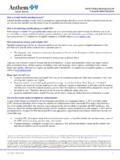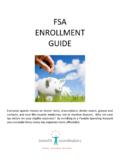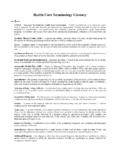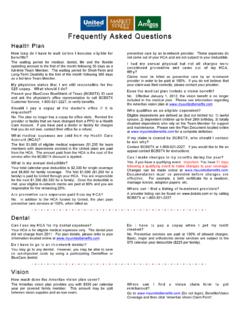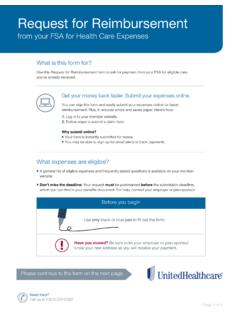Transcription of Dependent Care Flexible Spending Account Frequently …
1 Dependent care Flexible Spending Account Frequently asked Questions What is a Dependent care Flexible Spending Account ? A Dependent care Flexible Spending Account (FSA) is an employer-sponsored plan that allows you to set aside a portion of your income on a pre-tax basis and then use that money to pay for eligible, employment-related Dependent care expenses incurred for a qualifying individual. What is the advantage of participating in a Dependent care FSA? Participating in a Dependent care FSA can significantly reduce your taxes and increase your take-home pay by allowing you to use pre-tax dollars to pay for qualified Dependent care expenses including childcare, daycare, afterschool care , and day camp.
2 A complete list of eligible expenses is available online at *. Who is a qualifying individual? A qualifying individual is: Your Dependent child under the age of 13 who lives with you for more than half the year Your spouse or other qualifying Dependent who is physically or mentally incapable of self- care and lives with you for more than half the year What if I am divorced? If you are divorced and you are the custodial parent, your child is a qualifying individual even if you do not claim the child as a tax Dependent . A divorced, non-custodial parent cannot be reimbursed under a Dependent care FSA, even if the divorced, non- custodial parent claims the child as a tax Dependent .
3 What is an "employment-related" expense? To be eligible for reimbursement under your Dependent care FSA, an expense must be incurred so you (and your spouse, if married) can work or look for work. For this purpose, work may include actively looking for work but does not include unpaid volunteer work or volunteer work for a nominal salary. Your spouse is considered to have worked if he or she is a full- time student for at least five calendar months during the tax year or if he or she is physically or mentally incapable of self- care . Expenses you pay for Dependent care while you are off work due to illness generally are not eligible for reimbursement.
4 However, temporary absences from work may be disregarded if you are required to pay for Dependent care expenses during the absence. Whether an absence is short and temporary depends on the facts and circumstances of the situation; however, IRS. regulations state that an absence of up to two consecutive weeks due to illness or vacation is a short-term or temporary absence. What if I work part-time? In general, if you work part-time you must allocate expenses between days worked and days not worked. However, if you work part-time but are required to pay for Dependent care expenses on a periodic basis (including non-working days), you do not have to allocate expenses between days worked and days not worked.
5 These two scenarios are illustrated in the following examples. Allocation Required. You work three days a week and have voluntarily placed your child in day care five days a week so you may remain gainfully employed. Your cost for the childcare is $50 per day and $250 for the week. Because you work part-time and are not required to pay the full $250 expense, you must allocate your expenses according to your days worked. In this case, your allocated expenses equal $150 ($50 per day for the three days worked). *If you are not enrolled in an Anthem medical plan, you will need to log on to your Reimbursement Benefit Account at You will need your Anthem Reimbursement Account Number or Social Security Number and Date of Birth to log-in to the website for the first time.
6 Anthem Blue Cross and Blue Shield is the trade name of: In Colorado and Nevada: Rocky Mountain Hospital and Medical Service, Inc. In Connecticut: Anthem Health Plans, Inc. In Indiana: Anthem Insurance Companies, Inc. In Kentucky: Anthem Health Plans of Kentucky, Inc. In Maine: Anthem Health Plans of Maine, Inc. In Missouri (excluding 30 counties in the Kansas City area): RightCHOICE Managed care , Inc. (RIT), Healthy Alliance Life Insurance Company (HALIC), and HMO Missouri, Inc. RIT and certain affiliates administer non-HMO benefits underwritten by HALIC and HMO benefits underwritten by HMO Missouri, Inc. RIT and certain affiliates only provide administrative services for self-funded plans and do not underwrite benefits.
7 In New Hampshire: Anthem Health Plans of New Hampshire, Inc. In Ohio: Community Insurance Company. Virginia: Anthem Health Plans of Virginia, Inc. trades as Anthem Blue Cross and Blue Shield in Virginia, and its service area is all of Virginia except for the City of Fairfax, the Town of Vienna, and the area east of State Route 123. Wisconsin: Blue Cross Blue Shield of Wisconsin ("BCBSWi"), which underwrites or administers the PPO and indemnity policies; Compcare Health Services Insurance Corporation ("Compcare"), which underwrites or administers the HMO policies; and Compcare and BCBSWi collectively, which underwrite or administer the POS policies.
8 Independent licensees of the Blue Cross and Blue Shield Association. ANTHEM is a registered trademark of Anthem Insurance Companies, Inc. The Blue Cross and Blue Shield names and symbols are registered marks of the Blue Cross and Blue Shield Association. AT606 20101101 1. Dependent care Flexible Spending Account Frequently asked Questions Allocation Not Required. The facts are the same as above, but in this scenario your Dependent care provider requires that you pay the full $250 fee regardless of the number of days that care is actually provided. In this case, the full $250 expense may be considered an employment-related expense and allocation of the expense based on days work is not required.
9 What expenses are covered under a Dependent care FSA? A Dependent care FSA covers qualified Dependent care expenses incurred for the care of one or more qualifying individuals as described above. Typical eligible expenses include: Before school and after school care Expenses for preschool/nursery school Extended day programs Au pair services (amounts paid for the actual care of the Dependent ). Babysitter (in or out of the home). Nanny services (amounts paid for the actual care of the Dependent ). Summer day camp for your qualifying child under the age of 13. Elder day care expenses of a qualifying individual You may view a complete list of eligible expenses online at What expenses are not covered under a Dependent care FSA?
10 Ineligible expenses include the following: Amounts paid to your spouse, your child under age 19, a parent of your child who is not your spouse or an individual for whom you or your spouse is entitled to a personal tax exemption as a Dependent Expenses related to a disabled spouse or tax Dependent living outside your household Educational expenses Tuition for kindergarten and above Food expenses (unless inseparable from care ). Incidental expenses (such as extra charges for supplies, special events, or activities unless inseparable from care ). Overnight camp You may view a complete list of eligible and ineligible expenses online at How much can I contribute to my Dependent care FSA?
